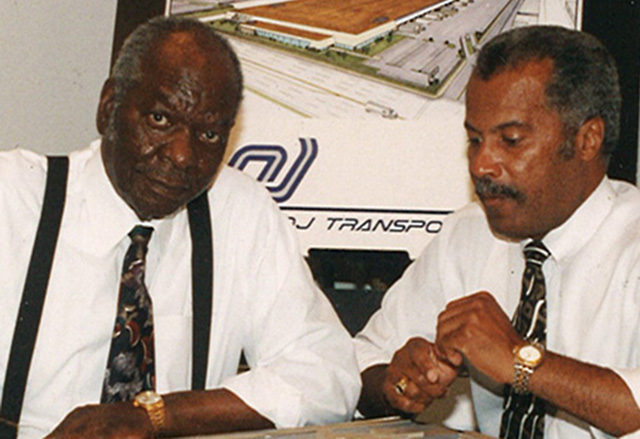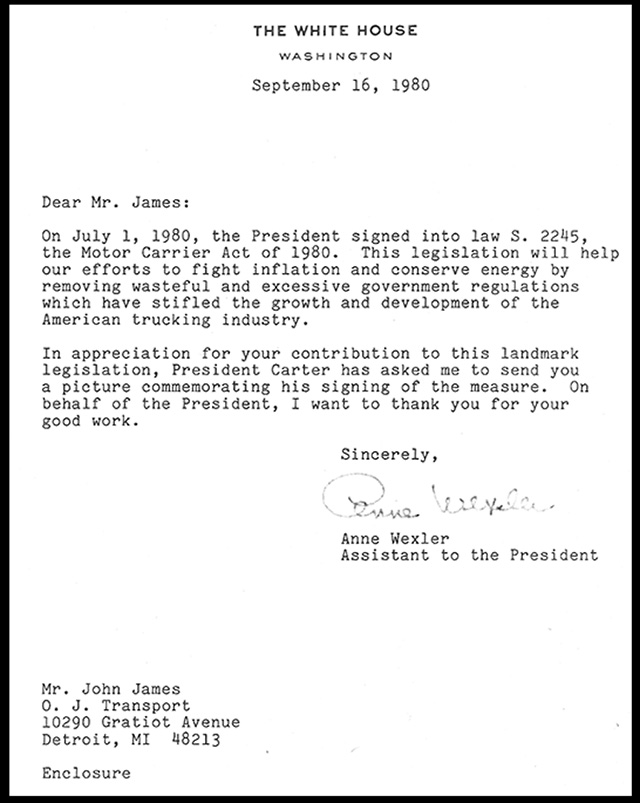
In 1971, John James was a management trainee at Chrysler when he learned that several colleagues of his had started a beer distributorship and they needed help bringing beer from Milwaukee to Detroit. This sounded like a business opportunity to so James discussed it with his uncle, Calvin Outlaw, who worked as a mechanic for Hertz Truck Rentals. When they bought a used Ford tractor and a 40-foot trailer, O-J Transport was formed.
O-J Transport had a customer, but it needed authority from the Interstate Commerce Commission (ICC) to operate across state lines. Applicants for permanent operating authority were routinely granted a 90-day “emergency temporary” permit. This permit would be automatically renewed until an ruling was made on the permanent grant of authority. By June 1971, O-J Transport was able to haul beer from Milwaukee to Detroit, but they could do nothing else; their trucks would have to return empty.
 Calvin Outlaw & John James (circa 1990s)
Calvin Outlaw & John James (circa 1990s)
James looked for other things to transport. He approached Harvey Warburton, a Transportation Supervisor at Ford. Since Ford was in the early stages of building its minority supplier base, Warburton saw this as an opportunity. James also got the Traffic Manager at GM’s Janesville plant to support him.
The first challenge to getting ICC approval was an oral hearing before an Administrative Law Judge (ALJ) in November 1973. The ALJ ruled in the O-J Transport’s favor, however those already approved companies protested. They argued that O-J Transport’s entry into the trucking business was unnecessary and would hurt them economically.
In support of O-J’s appeal, Ford argued that no business would be lost for existing firms because Ford would take traffic from its privately-operated truck capacity. Ford noted it had a strong interest in developing more minority suppliers.
By a 2-1 decision, the ICC Commission ruled against O-J Transport, arguing that the auto companies were giving the business to O-J simply because of its minority status, a reason not permitted under the law.
James appealed to the 6th Circuit of the U.S. Court of Appeals. In 1976 the Court made the same ruling as the ICC. He then appealed to the U.S. Supreme Court, which refused to take the case. They had lost, and O-J Transport would not be permitted to carry auto parts across state lines.
But in 1978, ICC Commissioner A. Daniel O’Neal (who was the minority in the 2-1 decision) became ICC chair. He encouraged James to reapply. O-J was granted a 90-day temporary permit to haul auto parts. The company was in the auto parts industry, and there to stay. Also, in that year the Michigan Public Service Commission gave O-J Transport intrastate operating authority. This allowed the company to haul auto parts throughout southeast Michigan.

On July 1, 1980 President Jimmy Carter signed the Motor Carrier Act into law. While not completely deregulating the trucking industry, it removed most entry barriers for new firms. It also gave the ICC a mandate to considering granting operating authority for minority-owned companies.
President Carter wrote John James a letter thanking him for his efforts in helping win passage of the Motor Carrier Act. Later that year O-J Transport became the first black-owned firm to receive permanent common carrier status to transport auto parts
Breaking Barriers: The O-J Transport Story, a scholarly paper that explores this case in greater detail.
Text & RESEARCH – DR. Mitchell Fleischer
PHOTO CREDITS
James Group International
Company Truck, Ownership Team, & White House Letter



